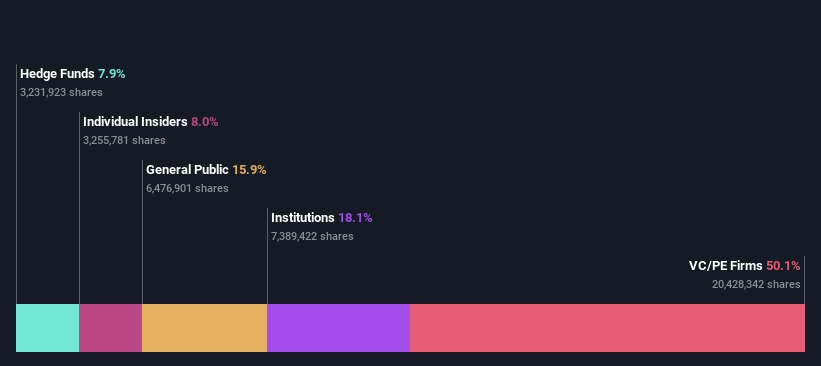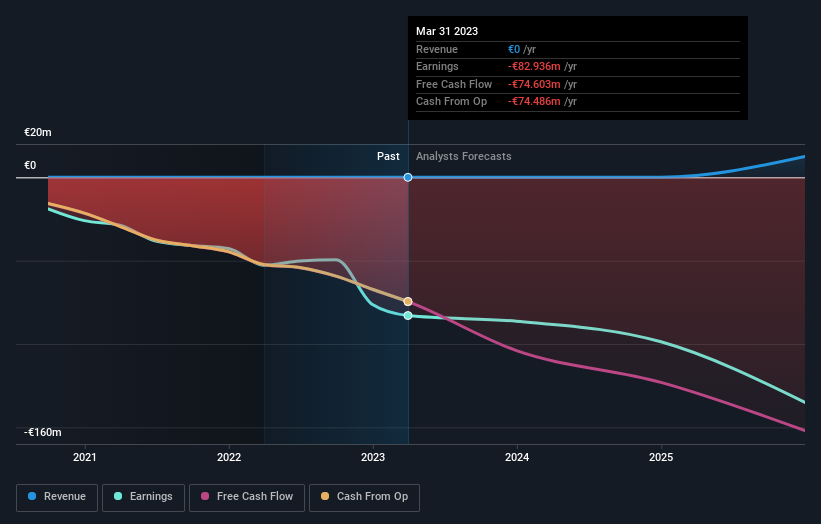Pharvaris N.V.'s (NASDAQ:PHVS) largest shareholders are private equity firms with 50% ownership, institutions own 18%
Key Insights
The considerable ownership by private equity firms in Pharvaris indicates that they collectively have a greater say in management and business strategy
The top 5 shareholders own 50% of the company
If you want to know who really controls Pharvaris N.V. (NASDAQ:PHVS), then you'll have to look at the makeup of its share registry. And the group that holds the biggest piece of the pie are private equity firms with 50% ownership. Put another way, the group faces the maximum upside potential (or downside risk).
And institutions on the other hand have a 18% ownership in the company. Large companies usually have institutions as shareholders, and we usually see insiders owning shares in smaller companies.
Let's take a closer look to see what the different types of shareholders can tell us about Pharvaris.
See our latest analysis for Pharvaris
What Does The Institutional Ownership Tell Us About Pharvaris?
Institutions typically measure themselves against a benchmark when reporting to their own investors, so they often become more enthusiastic about a stock once it's included in a major index. We would expect most companies to have some institutions on the register, especially if they are growing.
Pharvaris already has institutions on the share registry. Indeed, they own a respectable stake in the company. This suggests some credibility amongst professional investors. But we can't rely on that fact alone since institutions make bad investments sometimes, just like everyone does. It is not uncommon to see a big share price drop if two large institutional investors try to sell out of a stock at the same time. So it is worth checking the past earnings trajectory of Pharvaris, (below). Of course, keep in mind that there are other factors to consider, too.
Our data indicates that hedge funds own 7.9% of Pharvaris. That's interesting, because hedge funds can be quite active and activist. Many look for medium term catalysts that will drive the share price higher. Bain Capital Life Sciences Investors, LLC is currently the company's largest shareholder with 12% of shares outstanding. With 11% and 10% of the shares outstanding respectively, General Atlantic Service Company, L.P. and venBio LLC are the second and third largest shareholders. Additionally, the company's CEO Berndt Axel Modig directly holds 2.9% of the total shares outstanding.
Our research also brought to light the fact that roughly 50% of the company is controlled by the top 5 shareholders suggesting that these owners wield significant influence on the business.
While studying institutional ownership for a company can add value to your research, it is also a good practice to research analyst recommendations to get a deeper understand of a stock's expected performance. There are plenty of analysts covering the stock, so it might be worth seeing what they are forecasting, too.
Insider Ownership Of Pharvaris
The definition of company insiders can be subjective and does vary between jurisdictions. Our data reflects individual insiders, capturing board members at the very least. Management ultimately answers to the board. However, it is not uncommon for managers to be executive board members, especially if they are a founder or the CEO.
Insider ownership is positive when it signals leadership are thinking like the true owners of the company. However, high insider ownership can also give immense power to a small group within the company. This can be negative in some circumstances.
Shareholders would probably be interested to learn that insiders own shares in Pharvaris N.V.. As individuals, the insiders collectively own US$49m worth of the US$617m company. It is good to see some investment by insiders, but it might be worth checking if those insiders have been buying.
General Public Ownership
With a 16% ownership, the general public, mostly comprising of individual investors, have some degree of sway over Pharvaris. While this size of ownership may not be enough to sway a policy decision in their favour, they can still make a collective impact on company policies.
Private Equity Ownership
Private equity firms hold a 50% stake in Pharvaris. This suggests they can be influential in key policy decisions. Some might like this, because private equity are sometimes activists who hold management accountable. But other times, private equity is selling out, having taking the company public.
Next Steps:
It's always worth thinking about the different groups who own shares in a company. But to understand Pharvaris better, we need to consider many other factors. For instance, we've identified 5 warning signs for Pharvaris (2 are significant) that you should be aware of.
Ultimately the future is most important. You can access this free report on analyst forecasts for the company.
NB: Figures in this article are calculated using data from the last twelve months, which refer to the 12-month period ending on the last date of the month the financial statement is dated. This may not be consistent with full year annual report figures.
Have feedback on this article? Concerned about the content? Get in touch with us directly. Alternatively, email editorial-team (at) simplywallst.com.
This article by Simply Wall St is general in nature. We provide commentary based on historical data and analyst forecasts only using an unbiased methodology and our articles are not intended to be financial advice. It does not constitute a recommendation to buy or sell any stock, and does not take account of your objectives, or your financial situation. We aim to bring you long-term focused analysis driven by fundamental data. Note that our analysis may not factor in the latest price-sensitive company announcements or qualitative material. Simply Wall St has no position in any stocks mentioned.
Join A Paid User Research Session
You’ll receive a US$30 Amazon Gift card for 1 hour of your time while helping us build better investing tools for the individual investors like yourself. Sign up here

 Yahoo Finance
Yahoo Finance 

